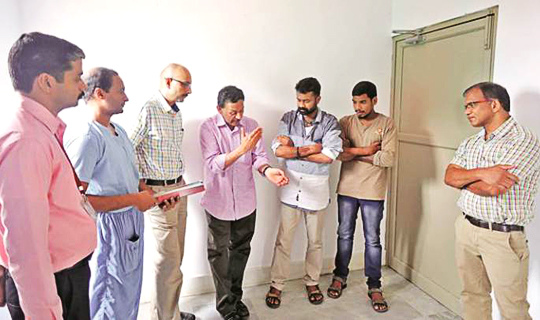Lend me a Hand - another AIMS success story

Ever since the first hand transplant in India in 2015, patients from across India and abroad have been lining up at a Kochi hospital, even as more hospitals have registered for the procedure. But only two more transplants have been possible since. The Sunday Express on the taboos, hopes and despair around the procedure
With a pakol (an Afghan cap) on his head and dressed in a deep green Pathani suit, paired with a neatly stitched half jacket, Sulemani Sulaiman slowly makes his way to his lodge, off a narrow lane in Ernakulam, the eastern mainland of Kochi. In his tiny room, Afghani kurtas hang on one wall, there is a broom in a corner, an electric food processor sits under the bed, while books on Islam occupy a side shelf.
Sulaiman leaves his prosthesis on the bed. It is uncomfortable. As he settles down, the tall and athletic 25-year-old begins reading the Quran, flustered when he can’t turn a page. “When I have hands again, I will earn and send my children to school,” says Sulaiman, in slow Pashto, staring at no one in particular. “That is his only wish. He sold his land and shop for this,” says his friend Ameer Muhammed, a madrasa teacher, who is here with him. A scrap dealer, Sulaiman’s last memory is that of a bomb blast near his shop in a village in Afghanistan’s Zabul province, neighbouring the restive Kandahar, in 2016. He woke up in a Kandahar hospital with both his hands amputated, right eye damaged and metal shards piercing his body. “I felt my life was over,” he says as Muhammed, who knows passable Hindi, translates.
Then, his brother in Iran told Sulaiman about India’s success at hand transplants. Nine months ago, Sulaiman sold his land and his scrap store for around Rs 25 lakh, and in March this year, he took a flight to Kochi — in search of hands. The transplant for both hands costs Rs 20 lakh. “We didn’t believe getting a dead person’s hand was possible. His wife persuaded him,” Muhammed says. “Bachcho ka taalim ke liye (For our children’s education),” mutters Sulaiman, a father of three.
In the three months that they have been here though, there has been no sign of a hand, with doctors unsure of when a donor would be available. However, the two can’t return home as they wait; should a hand come their way, the transplant would have to be conducted within five hours of it being detached from a donor’s body. A few lanes away, Mohammed Bahauddin, 21, who lives with brother Tofail Najmuddin in a guest house, has been waiting longer. The siblings from Bangladesh have been in Kochi for 14 months. Bahauddin doesn’t want to return home to Chittagong without hands, where he would be confined to a life indoors. He hides his stumps under long sleeves, and keeps his hands crossed over his chest all the time.
